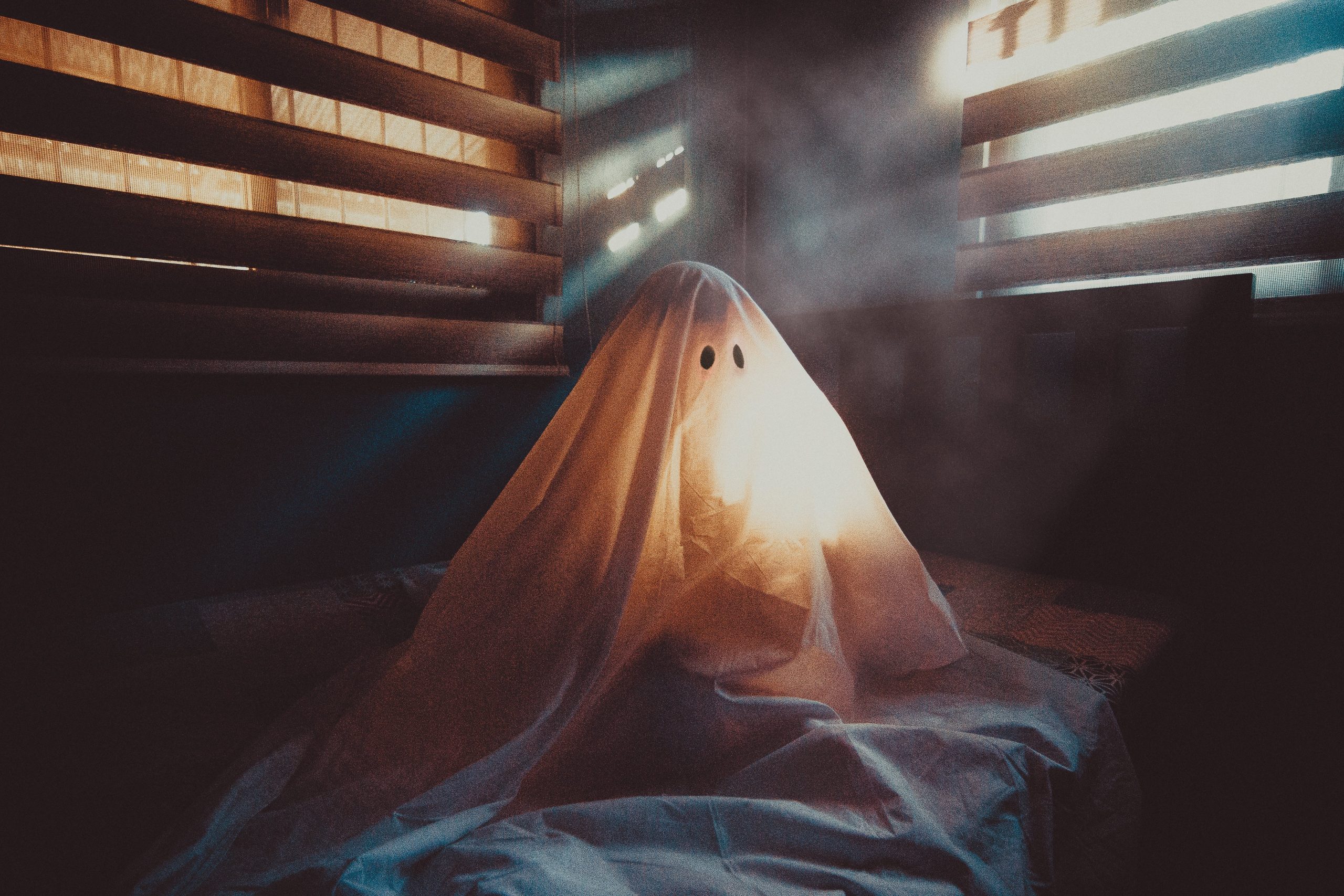
A sheet with two holes cut in for eye holes to resemble a ghost, sitting (or floating?) on a bed. Photo by Ryan Miguel Capili under Pexels license.
It’s a dark and stormy night, and the wind is howling as the trees tap, tap, tap along your window. Out of the night comes an unearthly noise, and an eerie feeling takes over you as the room becomes cold. Your mind begins to race as you feel a presence close by. It must be all in your head…mustn’t it?
Whether you believe in ghosts or the things that go bump in the night, the supernatural has proved to be a prevailing source of intrigue for the world and sociologists. We may not be able to prove the existence of the supernatural, but we can certainly look into the factors that shape and guide our experiences.
Cultic Milieu
Cultic or paranormal beliefs and experiences are both wide-ranging (including unorthodox science, magic, witchcraft, astrology, mysticism, healing practices, the occult, and more) and persistent across time.
These beliefs are unified by the fact that they are typically viewed as deviant to the dominant culture, particularly traditional religion and mainstream science. This stimulates a tolerance for other belief systems and a sense of support, as believers in the cultic or paranormal share an experience of having to justify their beliefs to mainstream society.
Colin Campbell argues that this cultic milieu is, “an underground region where true seekers test hidden, forgotten, and forbidden knowledge.”
- Colin Campbell. 2002. “The Cult, the Cultic Milieu and Secularization.” in The Cultic Milieu: Oppositional Subcultures in an Age of Globalization, eds. Jeffrey Kaplan and Heléne Lӧӧw. Walnut Creek, CA: AltaMira Press.
Supernatural Skepticism
Some scholars have also explored the process of how people come to develop cultic or paranormal beliefs. When patterns of strange and uncanny events occur, people often experience layers of doubt before concluding they have experienced a ghostly encounter. The will to believe battles against a desire to remain skeptical, especially in a highly rationalized, materialistic world.
“Because a ghost seemingly defies rationality, the person who believes risks his or her credibility and stigmatization.”
- Dennis Waskul and Michele Waskul. 2016. Ghostly Encounters: The Hauntings of Everyday Life. Pennsylvania: Temple University Press.
Studying practitioners of ritual magic in London in 1983, Tanya Marie Luhrmann questioned why users practiced magic when – to the eye of the outside observer – it did not work. Luhrmann found that individuals engaged in unintentional interpretive drift (a slow shift in how someone interprets events, what events they find significant, and what patterns they notice). Over time, they began to interpret events as a result of their magical practice. For Lurhman, such beliefs and practices are not so much exceptions to the modern quest for instrumental, scientific knowledge but a direct reaction to its limitations and shortcomings.
- Tanya Marie Lurhmann. 1989. Persuasions of the Witch’s Craft: Ritual Magic in Contemporary England. Massachusetts: Harvard University Press.
Hauntings
Some scholars focus on the social functions of ghostly hauntings. Hauntings may draw attention to loss (either of life or of opportunity) or reveal repressed or unresolved memories of individuals or communities (particularly memories of social violence). Ghosts can represent our empowered hopes, fears, and values. Experiences with ghosts may spur action, and–whether they truly exist or not–have real effects on those who believe in them.
- Avery F. Gordon. 2008. Ghostly Matters: Haunting and the Sociological Imagination. Minnesota: University of Minnesota Press.
- Marc A. Eaton. 2020. Sensing Spirits: Paranormal Investigation and the Social Construction of Ghosts (Interactionist Currents). New York: Routledge.
Gender and Race Belief Differences
Sociology has also found that social factors like race, education, and gender can influence someone’s perspective on the paranormal and supernatural, as one survey of American fears found. Women have been found to have a higher belief in things like ghosts, zombies, and supernatural powers while men are more likely to believe in things like bigfoot or extraterrestrials. The results suggest a difference in the material quality of the creature and its relation to scientific inquiry.
Black people were found to have higher beliefs in alien life and ghost encounters while Asian Americans had the largest fear of zombies. White people were more likely to believe in UFOs and psychic healing. The cultural significance of religion or spirituality for race may be an influencing factor in the findings. The level of education also impacts someone’s beliefs. Those with a bachelor’s degree or higher were less likely to believe in aliens, bigfoot, ghost encounters/hauntings, and Atlantis. However, other supernatural beliefs – such as supernatural human abilities and zombies – were not impacted by education.
- Tony Silva and Ashley Woody. 2022. “Supernatural Sociology: American’s Beliefs by Race/Ethnicity, Gender, and Education.” Socius 8.
- Tom Rice. 2003. “Believe It or Not: Religious and Other Paranormal Beliefs in the United States.” Journal for the Scientific Study of Religion 42(1):95–106.
The supernatural and paranormal have managed to intrigue the public for centuries and sociologists are no different. Why and how people engage with the spooky aspects of life can often tell us more about the social world than we’d first think. “To study social life one must confront the ghostly aspects of it.” – Avery Gordon

Comments